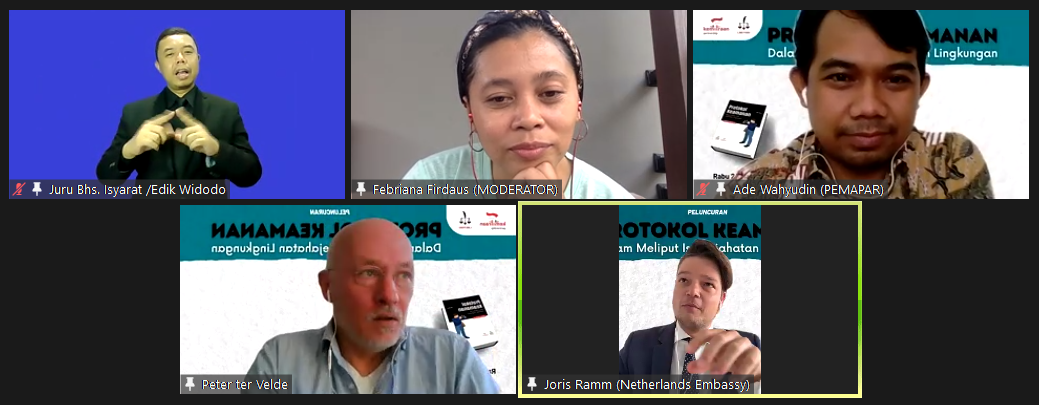
Jakarta, March 24th 2021 – Indonesia is experiencing a democratic setback due to restrictions on civil liberties. This condition is worsened by the increasing threats to residents who are defending their rights from the exploitation of natural resources and the environment in the name of development.
On the other hand, journalists as one of the pillars of democracy and tasked with covering and reporting events that occur in the environmental sector to the public are also not free from threats. They are often victims of violence, criminalization, and even murders that are allegedly carried out by powerful individuals.
The Press Legal Aid Institute (Lembaga Bantuan Hukum/LBH) recorded that there were 413 cases of violence against journalists in the last five years. Of that number, 117 cases occurred in 2020 – the most as long as LBH Pers was monitoring.
There are various forms of attacks received by the journalists. Some experienced beatings, destruction of covering equipment, psychological intimidation, and digital attacks.
Female journalists are also vulnerable to sexual violence at work. The results of the Jakarta Alliance of Independent Journalists (Aliansi Jurnalis Independen/AJI) survey in August 2020 of 34 journalists from various cities stated that 25 respondents admitted they experienced sexual violence. According to the survey, each respondent experienced more than one sexual assault. AJI Jakarta revealed that 63.3 percent of respondents chose not to report.
Although there were several respondents who had ventured to complain about the case, unfortunately, they did not receive any positive response from media companies. Some were not responded to, responded to but not followed up, even some are intimidated by the perpetrators and the office.
The portraits of violence against journalists are indeed more worrying, but not surprising. The reason is because until now, journalists in Indonesia work with minimal protection from the state, and without security protocols from the media companies where they belong.
This situation has also pushed LBH Pers and KEMITRAAN, with the support of the Dutch Embassy, to prepare the Security Protocol for Journalists in Covering Environmental Crime Issues which will be released on March 24, 2021.
This book describes in detail the things that journalists need to prepare before reporting, and the steps that must be taken when facing an attack. In the first part, this book discusses planning and preparation. Reviews on safety at the time of coverage are the subject of the second part. Next, part three talks about digital security, as well as an explanation of news and journalistic code of ethics in the next section. The last part discusses the issue of publication.

At the book launch event, LBH Pers invited a number of resource persons with experience in journalism. Dozens of people from various elements such as journalists, activists from civil society organizations, academics, and students also participated in the online event.
Secretary General of the Indonesian Cyber Media Union (Serikat Media Siber Indonesia/SMSI) M. Nasir, one of the speakers at the launch of the Security Protocol, revealed that the protocol for protecting and security for journalists in covering war and disasters already exists, but it is not complete yet and has become a standard operating procedure for the media in Indonesia. Nasir said, the publication of “Security Protocols for Journalists in Covering” answers the basic needs of journalists in reporting, especially the issue of environmental crimes.
A similar statement was conveyed by the Chairperson of the Indonesian Cyber Media Association (AMSI), Irna Gustiawati. “Finally, we have a journalist security protocol. This security protocol is very complete. This is what we’ve been waiting for,” he said. Another resource person, Joris Ramm from the Dutch Embassy, also gave his praise to LBH Pers and KEMITRAAN for responding to the need to protect journalists’ safety through this security protocol.
KEMITRAAN understands that the efforts to realize security protection for journalists in the midst of the declining quality of democracy is not an easy matter. However, KEMITRAAN considers that the publication of the “Security Protocol for Journalists in Covering Environmental Crime Issues” can be an entry point for conducting advocacy and establishing stronger cooperation with journalist groups, so that respect for, protection of human rights and human rights defenders can be fulfilled.
The hard work to achieve that goal indeed should not stop here. More efforts are needed so that media companies are willing to commit to adopting and implementing it in the work environment. In addition, as stated by another speaker at the event, Peter ter Velde, Project Manager of Pressvlig, a press organization in the Netherlands that focuses on journalists’ security issues. He said the government, even the police and political parties must also carry out their role in guaranteeing press freedom so that the protection of journalistic work in Indonesia can be fully achieved.
Security Protocol Book for Journalists in Covering Environmental Crime Issues
Check out the book launch event “Security Protocols for Journalists in Covering Environmental Crime Issues” below.






